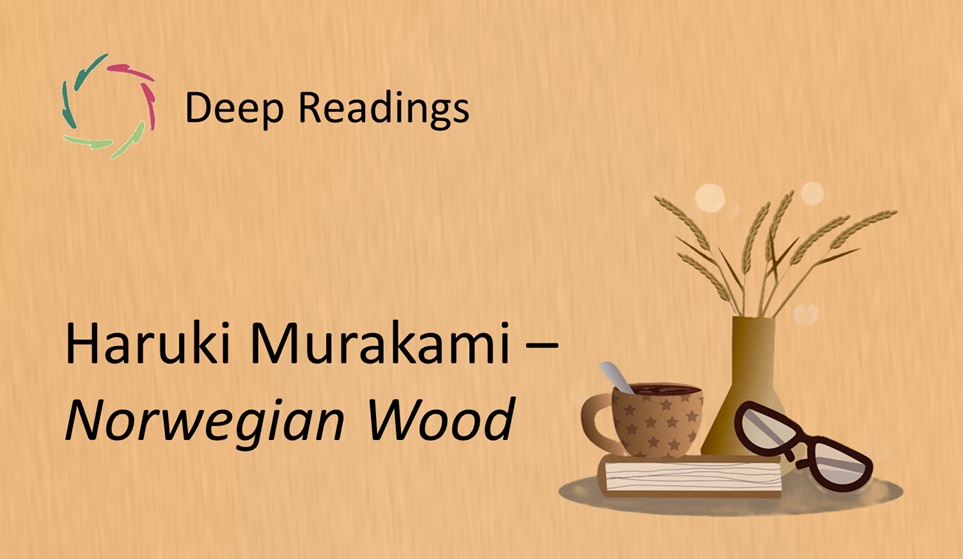Deep Readings: Haruki Murakami – Norwegian Wood

The Fragment
“I was thirty‑seven then, strapped in my seat as the huge 747 plunged through dense cloud cover on approach to Hamburg airport. Cold November rains drenched the earth and lent everything the gloomy air of a Flemish landscape. The Beatles’ song Norwegian Wood began to play.”
(Short quote due to copyright)
[Read more → widely available online excerpts and reviews]
Contextual Glimpse
Published in 1987, Norwegian Wood was the novel that brought Haruki Murakami international fame. A nostalgic tale of youth, love, loss, and memory, it is set mainly in 1960s Tokyo. The opening scene places us in 1970s Europe, where the narrator hears the Beatles’ song that gives the book its title. This triggers the cascade of memories that shape the entire novel. Murakami weaves together Western cultural references and Japanese sensibility, creating a bridge between worlds, time, and identity.
Resonance
The fragment intertwines three layers: the turbulence of the airplane, the bleak November landscape, and the sudden intimacy of a remembered song. Memory, landscape, and music merge into a single threshold moment. This is how nostalgia works: a sensory trigger opens a floodgate, pulling us out of the present and back into formative moments of love and loss. Murakami captures the fragility of time — how a single melody can undo decades, collapsing then and now.
Why this may also be about you
Murakami’s novel begins with memory triggered by a song — the Beatles’ Norwegian Wood. This is not only Toru Watanabe’s story; it is also a reflection of how music unlocks our own past. Each of us knows the sudden pull of a melody that opens doors long thought closed, carrying us back to people and places we thought we had left behind.
The novel’s fragment reminds us that memory is not passive. It grips, unsettles, and reshapes us. Murakami shows how a single note can revive both joy and sorrow, leaving us changed. In this way, his work is less about nostalgia than about the living power of remembrance.
Lisa’s inspired, original idea about this fragment
Perhaps the song in Murakami’s novel is not only a trigger of memory but also a bridge between worlds — between past and present, between the living and the dead. When music calls us back, it does not simply replay what was; it creates a new meeting point where then and now can converse.
In this light, the fragment suggests that memory itself is a form of dialogue. The song does not belong to the past or present alone, but to the space where they overlap. Murakami’s vision invites us to listen to our memories as if they are speaking freshly, here and now.
Echoes
Since its publication in 1987, Norwegian Wood has echoed far beyond Japan. It became a cultural phenomenon, selling millions of copies, and for many readers it defined an entire generation’s experience of love, loss, and youthful melancholy. The Beatles’ song, woven into the novel, gained new layers of association for readers who could never again hear it without recalling Murakami’s characters.
Its echo continues as the novel is adapted into film and re‑read around the world. The resonance lies in its universality: the way it binds a Western pop song to an intimate Japanese narrative, creating a bridge across cultures. To this day, Norwegian Wood echoes whenever a piece of music unexpectedly carries someone back into their own story.
Inner Invitation
Close your eyes. Recall a song that is bound up with your own past. Let it play in your imagination. Notice what memories surface — images, feelings, faces. Don’t judge or analyze; simply let them arrive. Ask yourself: what part of me still lives in that music? Let the fragment live inside you for a while, as if the melody itself is a doorway.
Closing Note
Murakami’s opening shows us how memory can strike without warning, like turbulence in the air. A single note, and the hidden corridors of our lives swing wide open.
Keywords
memory, nostalgia, music, song, identity, love, loss, time, turbulence, landscape, Murakami, Beatles


